As you approach menopause, you’ll experience a whirlwind of menopausal symptoms, affecting your daily routine, diet, sleep patterns, and more. Symptoms like hot flashes, weight gain, chills, etc., will inevitably come during your menopausal phase. However, stress is a symptom that can remain with you even after menopause.
According to 2010 research by Apa, women are more likely (28%) to report stress-related problems than men (20%). The sharp difference between stress experienced by women and men is narrowed down to factors like the nature of your job, marital problems, and menopause.
Everyone has experienced some form of stress at some point in their lives. However, menopausal women stand a higher chance of suffering from stress due to menopause. Hormonal changes in women cause many changes to their physical and emotional well-being.
Dealing with menopausal stress isn’t a one size fits all situation; we know people are built differently. However, in this article, we’ll discuss ten of the best ways you can use easily to deal with stress during menopause.
10 Ways You Can Easily Deal with Stress During Menopause
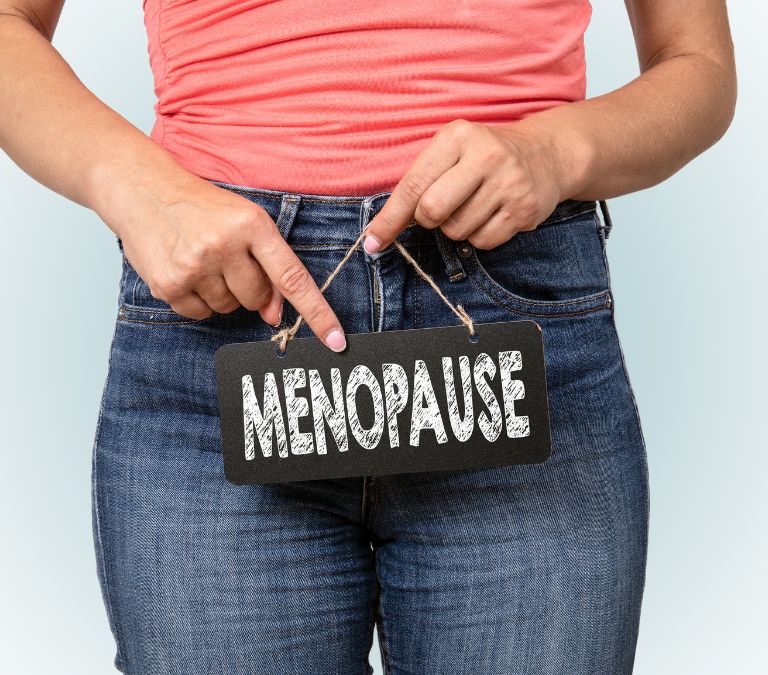
- Exercise Regularly
Exercising is probably your best bet if you’re looking for the most natural way to relieve yourself of stress. Exercise in any form or duration can go a long way in relieving stress because exercising boosts your feel-good endorphins, thereby taking your mind off problems stressing you out.
According to the research, regular exercise helps reduce menopausal stress and improve overall mental health. You don’t need to be an athlete to exercise, or you don’t even need athlete-rated exercise to help with your menopausal stress, routines as simple as walking every day can rejig your body endorphins to help you feel relaxed.
Normally, the human body produces cortisol to help regulate and manage stress. During menopause, your hormonal coordination – estrogen levels drop, causing other hormones like cortisol to spiral out of control.
Your body utilizes cortisol to cope with stress, but excess cortisol concentration in the body can damage your health. That is why it’s necessary to avoid continued stress. The longer you suffer from stress, the higher the cortisol in your body.
Regular exercise reduces your body’s cortisol level and also brings notable improvements to your body’s metabolism. When you go through menopause, the feel-good hormones in your body (endorphins) are significantly reduced. However, exercising can help stimulate such hormones to help you cope with stress.
A lot of studies have proven that a large portion of women suffers stress due to their physical appearance. According to Fortune Journals, women who are obese stand a higher chance of experiencing stress due to their body image.
Exercising isn’t a fast-acting drug to make you fit, but it’s a journey that, if followed judiciously, can set you up for a lifetime of healthy living. If you’re dealing with stress due to your perceived body image, exercising can help you get into shape and have that physique you’ve always wanted.
- Get Proper Sleep
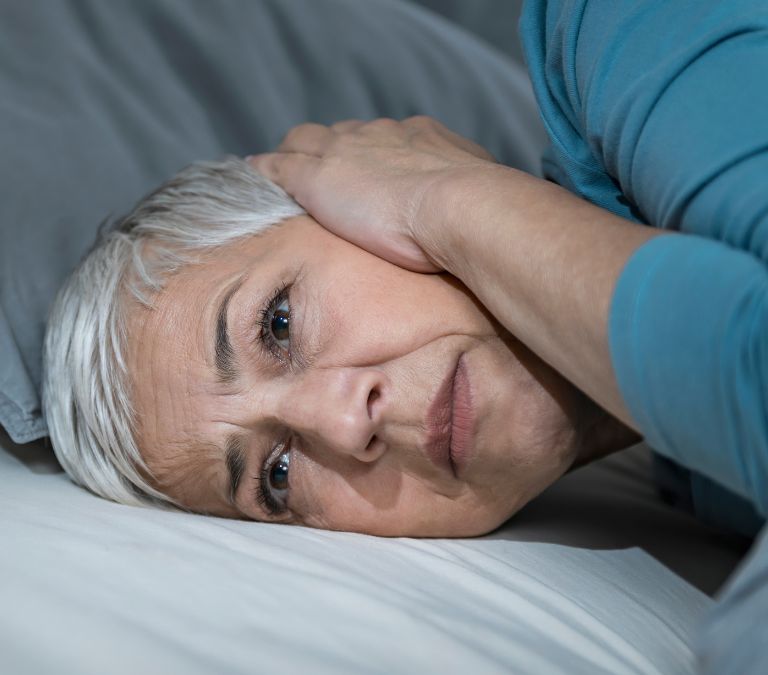
One of the most common menopausal symptoms is sleeping disorder. During the menopause transition, many women find it hard to sleep properly due to the extreme effects of hot flashes or sweat during the night. Women suffering from such symptoms see getting an 8-hour sleep as a dream.
Many middle-aged women experience sleep troubles due to job problems, marital issues, loss, etc. Whatever trauma they’ve experienced sometimes dents their sleeping patterns. Symptoms like hot flashes, night sweats coupled with depression, and stress combine to produce an impossible sleeping routine.
Medication can help reduce insomnia but in general, dealing with sleep disorders starts with developing a proper sleeping habit. Over-the-counter sleeping aids like melatonin can help put you to sleep, but they are not long-term solutions to insomnia.
When you lack adequate sleep, you’ll feel irritable, depressed, and ultimately stressed when you wake. We know most people have jobs requiring them to be awake during the night, but if you keep subjecting yourself to poor sleeping habits, you’ll gradually develop coping mechanisms like depression, stress, high blood pressure, and more.
Sleep should be your major priority to maintain your mental health during menopause. To develop a healthy sleeping habit, you must follow a few dos and don’ts.
You Should:
- Increase your daytime activity so that you’ll be tired at night
- Have a steady wake-up time in the morning
- Make your sleeping environment comfortable
- Bathing before bedtime can increase your appetite for sleep
You Should Not:
- Nap during the day unless you’re a shift worker
- Sleep in a noisy environment
- Eat heavily before bedtime
- Sleep in extreme weather conditions – cold or hot
- Use stimulants like caffeine
If you follow these little dos and don’ts consistently, you’ll sleep better at night.
- Maintain a Healthy Diet

When people talk about stress-relief solutions, our diet is often overlooked due to more dominating solutions like exercise or sleep. However, your diet could be the key to unlocking a stress-free menopausal lifestyle.
While you can’t necessarily live a stress-free life, you can go a long way in reducing the effects of stress. The food you give to your body determines the health and appearance of your body. Healthy eating can help reduce symptoms of menopause, like weight gain, but a healthy diet can also help with stress relief.
Your body might be okay with a few stress episodes, but prolonged stress will lead to persistent hormonal elevation, which in turn causes health problems like weight gain, digestive issues, chest pain, etc.
The body is built to utilize calories gotten from eating in specific ways. If you suffer from chronic stress, your body modifies the manner of managing calories. Stress can lead to leptin resistance, raising the body’s metabolic needs.
However, if you have a healthy eating routine, you reduce the risk of stress. Nutrients gotten from food helps to regulate and improve blood flow.
For example, eating sweet potatoes can help reduce cortisol levels in the body. Sweet potatoes contain vitamin C and Potassium that helps manage the stress response.
With the right food combination, you can greatly reduce the effects of stress. Your diet should contain massive amounts of vegetables, whole grains, protein, and dairy products. Fish is also a worthy inclusion in a healthy diet as fishes contain omega-3 fatty acids, which are instrumental in influencing the brain and central nervous system cells.
Fruits like oranges, lemons, grapefruits, and other citrus-related fruits can help ease menopausal symptoms.
- Avoid Caffeine or Alcohol
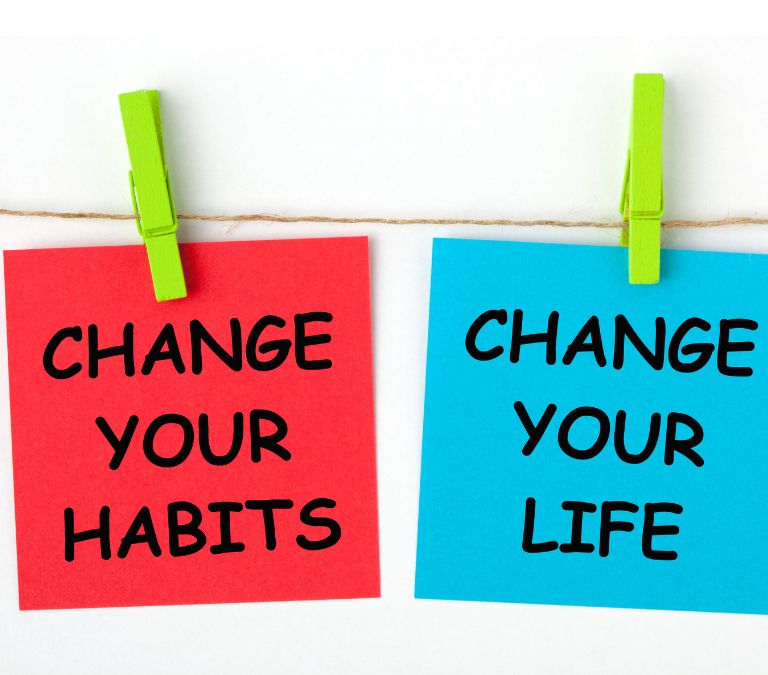
Coffee is very good for making you agile, boosting energy levels, and even productivity. However, caffeine can become detrimental when you transition to menopause. Most people, men and women alike, increase their coffee intake as their working hours increase. It might help them stay productive at their jobs but repeating such a cycle will have underlying health effects.
Within a few minutes of taking caffeine, you’ll feel the effects working their magic, and it can stay in your system for multiple hours. Caffeine has as many benefits as problems. For menopausal women, the problems significantly outweigh the benefits.
For example, some health experts recommend coffee to help increase your mental alertness, but this benefit’s side effect would be visible in your sleep patterns. Your body produces adenosine hormones to help keep you calm. Caffeine inhibits the flow of adenosine in your body, eliminating the calm and keeping you alert.
After you’ve remained mentally alert during the day, the effects will come back to bite at night – you’ll be unable to sleep.
Caffeine can also increase the cortisol level in the body. Cortisol, a major stress influencer, can leave you in a state of prolonged stress if the cortisol levels in your body are higher than normal.
Caffeine keeps you awake more than you should, thereby reducing the amount of sleep you get. When you repeat this cycle, your mental alertness for the next day is cut significantly due to your inability to sleep.
If you take in high levels of caffeine, your emotional health will remain unbalanced and only stabilize when you take more caffeine, leading you to a path of addiction. Caffeine has decent health benefits, but you should only ingest caffeine moderately to avoid causing additional health problems.
- Deep Breathing Exercises

When you’re anxious, your heart rate increases alongside your breathing. A simple deep breath in and out can make you feel less anxious. Deep breaths can help calm your nerves and ease the concentration of stress hormones in your body.
When your breathing accelerates, the oxygen level in your body drops significantly, leading to a build-up of stress hormones in your blood. However, when you take deep breaths, you increase the amount of oxygen in your blood flow, and in turn, your brain reacts by reducing the concentration of stress hormones in your body.
Breathing exercises can help relieve menopausal stress if you make it a consistent hobby. Depending on the time you can afford, breathing exercises take seconds or a few minutes. Ten minutes of consistent deep breathing can help reduce stress hormones if you can spare more time.
Deep breathing exercises are also called controlled breathing exercises. It means breathing done according to a specified pattern or procedure. Breathing exercises increase the oxygen in your body, which regulates your heart rate, and blood pressure and help ease tensions in your body.
Before you begin your deep breathing exercises, ensure you wear comfortable clothes to prevent you from choking yourself during the process. It’s also recommended that you do this routine at least twice daily to see the effects.
Aside from stress relief, deep breathing can also help lower your heart rate, increase your physical energy, regulate oxygen levels in the blood, reduce lactic acid concentration, and many more.
Deep breaths might not be the best option for women with previous cases of hyperventilation and panic attacks to help relieve menopausal stress.
- Yoga
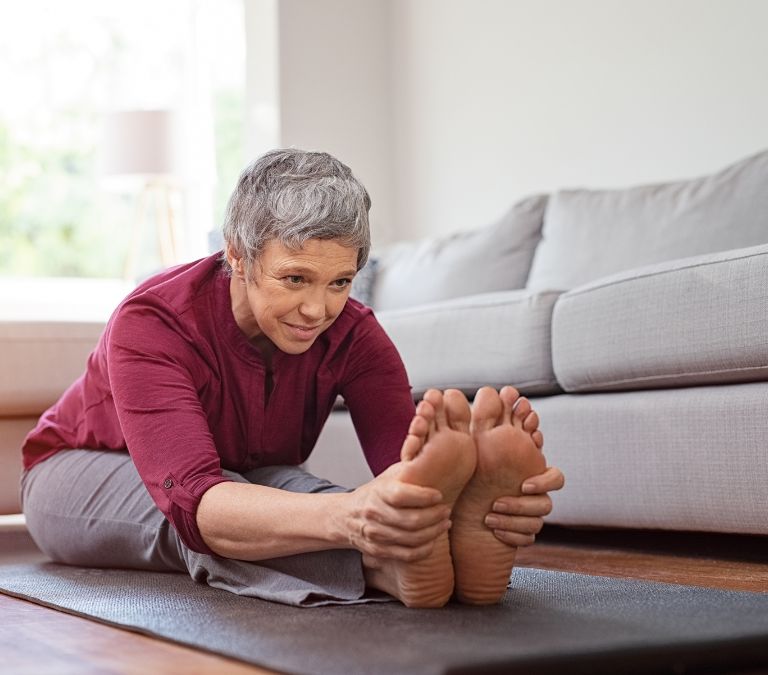
Yoga is a great way to deal with stress during menopause. Yoga is a physical and mental activity that utilizes physical poses, meditation, and deep breathing, to keep you in a relaxed mood.
Yoga is almost like a combination of three of our points here; meditation, deep breathing, and exercise. The importance of yoga cannot be over-emphasized; you can achieve mental peace and stability when you practice yoga.
Yoga comes in different routines, styles, and intensities. What determines the type of routine you practice is your desired result. If you’re looking to reduce stress, Hatha yoga is one of the most popular styles of yoga for stress relief.
Yoga poses are specific movements designed to improve the body’s flexibility and strength. You might lie flat on your yoga mat for the most basic yoga poses, while more complex poses may have you stretching beyond your limits.
Yoga also teaches you how to practice controlled breathing. Poses combined with breathing techniques and meditation, yoga is a strong and effective solution to menopausal stress.
Yoga is great, especially for relaxing, but there are some precautions you need to take before getting down on that yoga mat. While yoga might be considered a safe activity for most people, there are still situations where practicing yoga might be a health hazard.
For example, if you have severe osteoporosis, yoga might not be the best solution to deal with menopausal stress; you may risk your already diminishing bones. It is also good for people suffering from uncontrolled blood pressure, severe eye conditions, herniated discs (spinal cord disorder), or blood clots.
If you have any of these underlying conditions, you may still be able to practice yoga, but you should consult your doctor to confirm which poses are safe for you.
- Minimize Phone or Screen Time

According to research, the average human spends at least 7 hours daily looking at screens. These 7 hours consist of work, play, leisure, and other activities requiring a screen. If you spend an extended amount of time staring at screens, you may be causing yourself stress in the long run.
Researchers also discovered that during the Covid-19 pandemic, anxiety and stress reports increased significantly due to increased time spent viewing content. While we often use our phones to relieve ourselves of stress by watching funny videos, memes, etc., excessive usage of screens can lead to moderate depression.
The pandemic forced many workers to shift their base of operations online, thereby increasing their previous amount of screen time. Technology is a valuable resource, especially for digital learning and marketing, but science is proving that overuse of technology can disrupt the normal function of the brain and the central nervous system.
When you stare at screens for long periods, your central nervous system becomes agitated, causing you to feel angry, isolated, aggressive, and impulsive. In the 21st century, we can’t prevent people from using technological gadgets, but we can do our best to regulate them.
If you’re suffering from menopausal stress and spend a lot of time in front of screens, reducing your screen time can go a long way in reducing stress. Your body and brain require basic human interaction to maintain your mental health.
You need to meet people, interact, and visit some friends. Any activity that doesn’t involve screens would be a plus here. However, if you need screens to help with your brain activity, you can try listening to music; you’ll still have fun without looking too much at screens.
- Spend Time with Your Family and Friends

What better way to forget about your problems than talking to your best buddies and spending quality time with your family? An active social lifestyle is one of the quickest ways to avoid loneliness and deal with stress.
According to a 2008 poll by Gallup, they found out people spend an average of 6 – 7 hours daily with their friends and family. They also indicated that these 6 – 7 hours remain the happiest periods of the person’s 24-hour daily experience.
You might think you’ve got some thousand followers on Facebook or your Youtube subscribers, but when sharing personal information, you need to talk to close friends and family. When you transition into menopause, you’ll experience several symptoms that you’ll find hard to disclose.
However, your family members are always available and will often lend a listening ear if you’re willing to share with them. Socializing and interacting with friends will keep your heart emotionally young and active.
To help you forget your stress and struggles, you can visit an old friend or a distant relative. Volunteer at local parks and gatherings. Do anything that will keep your social lifestyle active.
When you’re stressed, visiting your family or interacting with friends won’t necessarily relieve you of stress, but it temporarily takes your mind off anything that’s stressing you out. Experts have proven that people who spend at least 6 hours of their day interacting with their family and friends tend to live happier lives.
During your menopause transition, try not to push people away; instead, socialize, and make new friends, so you can easily deal with stress.
- Use Guided Meditation
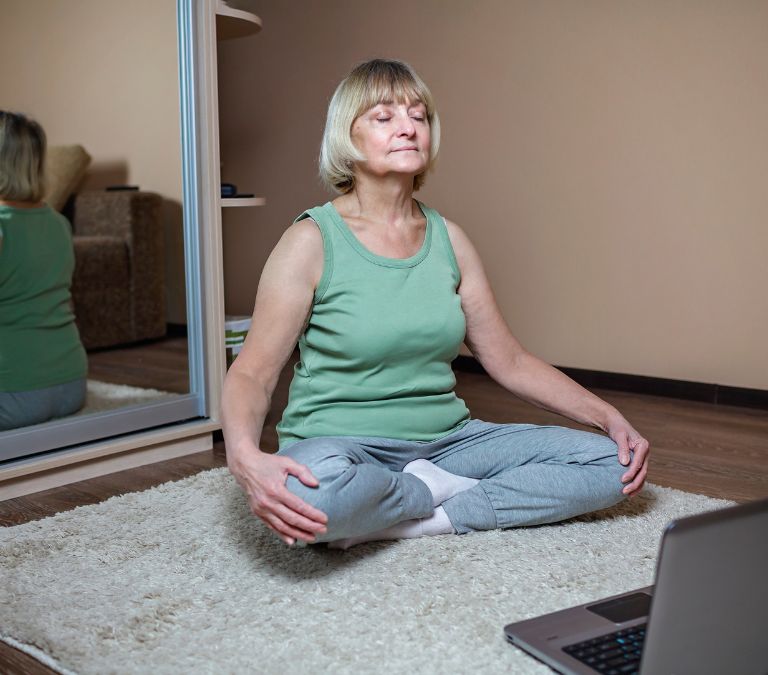
Meditation is one of the simplest techniques you can implement to help deal with stress during menopause. Meditation is very effective at reducing anxiety, depression, and stress and also improves your cardiovascular health.
Whenever you experience stress, your body’s fight or flight hormone responds swiftly. You’ll experience a rush of adrenaline which can increase your blood pressure, heart rate, and blood flow. Meditation can help calm the body’s reaction to your fight-or-flight hormones.
When deeply relaxed, your metabolism, heart rate, blood pressure, and breathing will reduce significantly. If you train your body to meditate at least 10 minutes every day, you’re building up a steady routine that will help improve your mental health and reduce stress.
Meditation is done in a private and quiet environment; you don’t want to relax your hormones right next to someone who’s having band practice. You should also ensure that your meditation room is free of distractions so you can follow your routine without interruptions.
Your meditation room should also be a place that’s comfortable but not too comfortable with making you fall asleep during your sessions. Most people meditate by repeating a word, phrase, or sound that has a personal connection to them.
You can sit or lay down during your meditations; ensure that whichever position you choose allows you to relax your muscles freely and naturally. It’s not recommended you meditate less than two hours after a meal; your digestive system might interfere with the process.
Whichever way you achieve your preferred relaxation state, meditation will help reduce stress during menopause.
- Consider Using Supplements

As your estrogen levels decrease during menopause, you’ll experience a cascade of menopausal symptoms like hot flashes, insomnia, stress, and depression. If you’ve tried natural means of dealing with menopausal stress and you’ll like to try a medical approach, there are several vitamins you can take to ease your stress.
Vitamins and minerals provide the body with physical and emotional benefits. Vitamins can help repair damaged cells, heal wounds, strengthen your bones, and many more. However, vitamins are an essential stress-relief compound that can help regulate your emotions.
Vitamins B1, B2, B3, B6, and B12 are essential in maintaining the central nervous system. You can get vitamins from fruits, food, and the sun (Vitamin D). Generally, foods that are brightly colored tend to contain antioxidants which are found in vitamins.
Fruits and vegetables like oranges, blueberries, lemons, melons, etc., are good sources of vitamins. Plant-based foods like beans, seeds, nuts, etc., are also good vitamin sources.
However, you can also get vitamins from taking supplements. These supplements are pills designed to artificially replicate the effects of vitamins in your body. If you need vitamins to deal with stress, you can check out Black Cohosh, Maca, B-vitamins, Melatonin, Magnesium, etc.
These supplements will provide you with enough vitamins to help ease your menopausal stress.
Conclusion
Stress is a menopausal symptom that every woman will experience during their transition phase. It can be overwhelming and increasingly difficult to manage if you don’t apply the right techniques and solutions.
Luckily, we’ve compiled a list featuring ten of the best ways you can deal with menopausal stress. If you follow each of these solutions, you’re guaranteed to improve your stress management capabilities during and after menopause.







